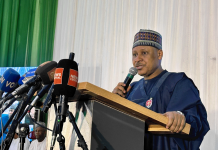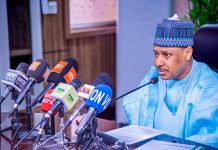
A SPEECH OF THE HONOURABLE MINISTER OF HEALTH, DR. OSAGIE EHANIRE AT THE PRESIDENTIAL TASK FORCE ON COVID-19 PRESS BRIEFING ON THURSDAY 16TH APRIL, 2020
PROTOCOL
As of today, 16th April, 2020, a total of 407 people have been confirmed to have COVID-19, 99 patients have been discharged and 12 deaths have been recorded in Nigeria, all with comorbidities. The 34 new cases confirmed are distributed as follows: 18 in Lagos, 12 in Kano, 2 in Katsina, and 1 each in Delta and Niger States.
2.Quite unfortunately, the latest fatality in Lagos is a medical professional; I want to express my condolences to the family. This highlights the risk to health workers in this COVID-19 response. Patients with mild symptoms are still very highly infectious, and mild symptoms in one person could be deadly infection in another. That is why we recommend the suspension of close contact between grandchildren and grandparents, at this time. Our valuable health workers are urged to adhere to all government instructions and regulations; always utilise personal protective equipment (PPE); maintain a high index of suspicion for COVID-19; and protect yourselves, your loved ones and your colleagues.
3.I shall use this opportunity to again strongly advise health professionals against private or secret management of people who have COVID-19 outside of accredited health facilities. We cannot afford avoidable morbidity and mortality. Private facilities must obtain accreditation to treat this highly infectious disease. Practitioners engaging in unauthorised treatment of COVID-19, run the risk of being shut down for decontamination.
4.This next phase of our strategy, due to the available evidence of community transmission in Nigeria, now focuses on the community. There will be more community testing and social mobilisation at the grassroots to ensure physical distancing and advisories on the use of masks or improvised face coverings like handkerchiefs or scarves over the mouth and nose, to reduce risk of transmission. Again, the revised case definition for testing includes:
▪ All patients with acute respiratory distress syndrome
▪ Contacts of people confirmed to have COVID-19, with fever and respiratory tract symptoms
▪ Persons with fever and respiratory tract symptoms of unknown cause
5.Despite being the epicentre of the COVID-19 outbreak in Nigeria, the response in Lagos State and the Federal Capital Territory (FCT), is commendable as they strive to enhance case-finding by conducting house-to-house and cluster testing based on epidemiological assessments. Our ability to do this strategic scale-up of testing over the next 2 weeks, will go a long way in promptly detecting, testing and treating people with COVID-19.
6.The national testing capacity has been increased to 3,000 per day in 13 molecular laboratories nationwide activated by the Nigeria Centre for Disease Control (NCDC). The target this week is to significantly increase the national testing capacity further; 2 more laboratories are scheduled to come online in Borno and Sokoto States.
7.The states have been supplied sample collection kits and are encouraged to develop innovative methods to improve testing capacity such as engaging the private sector to outsource and diversify sample collection sites and improve logistic support.
8.Citizens still have a major role to play by taking social responsibility through adherence to the lockdown measures and regulations.
9.The COVID-19 outbreak has provoked social stigma and discrimination against anyone thought to have been in contact with the virus as well as people of certain backgrounds. This negative association means those with the disease, their caregivers, family, friends and communities, are labelled, stereotyped, discriminated against, and treated poorly because of a disease.
10.Unfortunately, stigma can prompt social isolation of persons or groups and drives people to hide the illness, prevents them from seeking health care immediately, and discourages them from adopting healthy behaviours. This could cause a situation where the virus is more likely to spread and increase the difficulty of controlling the COVID-19 outbreak. We must not stigmatise persons who have recovered from COVID-19.
11.Having said that, I strongly advise that persons who test positive for COVID-19 enter into accredited isolation and treatment centres for proper management. This not only gives them the best prospects of survival and recovery, but protects their family and friends, domestic and office staff, and the community, from infection. If not, it will be counterproductive. We have developed various isolation and treatment facilities to meet all expectations of security, privacy and comfort, and I therefore urge citizens to cooperate with case managers.
12.This fight against COVID-19 is like climbing a steep where we cannot see the top: it is hard work, it is precarious and we must work together to succeed. The whole of Nigeria is in this together, along with the global community.
13.Stay safe at home, if you must go out, practice physical distancing. Wash hands regularly or use sanitisers, sanitise surfaces thoroughly. The government thanks you for your understanding and forbearance.
Thank you.





